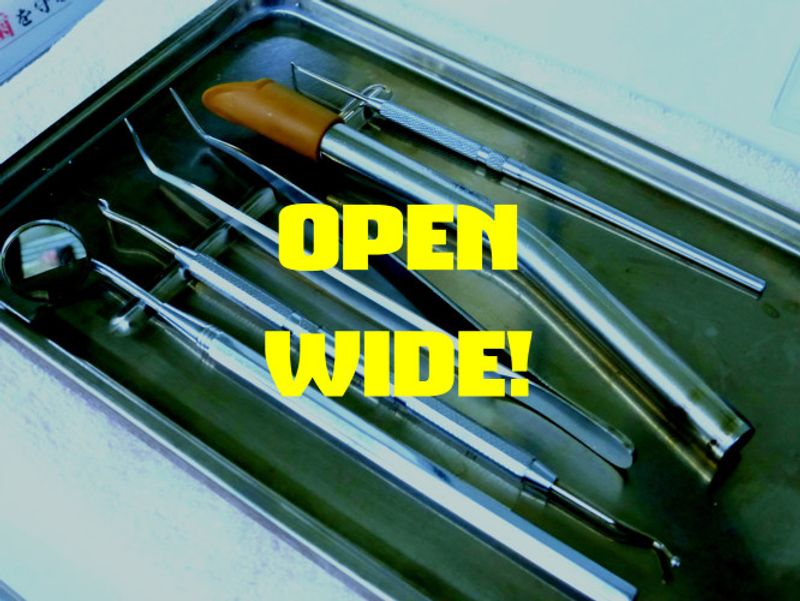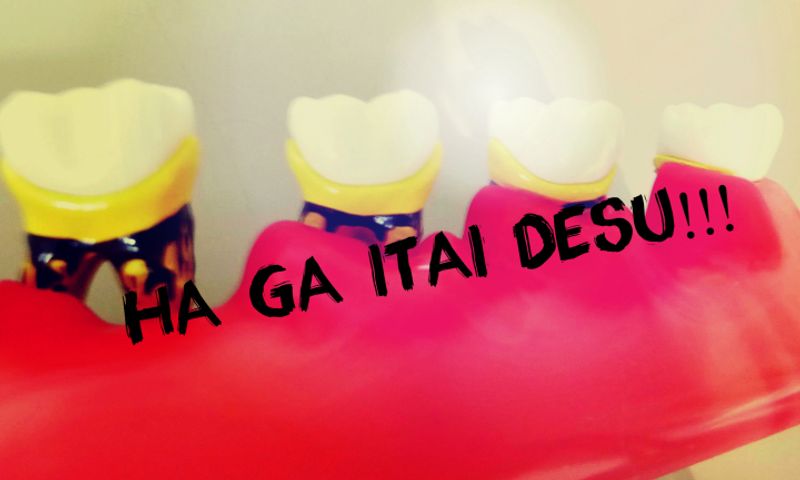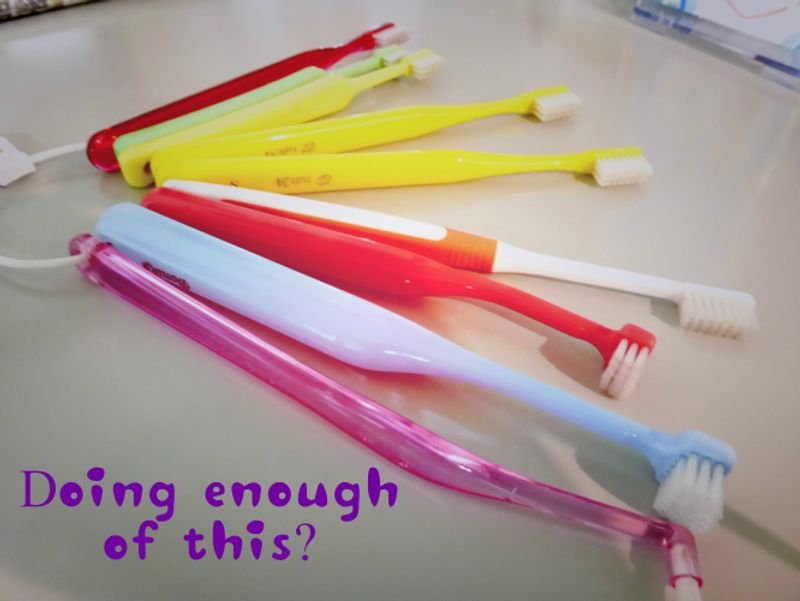Apr 14, 2015
Dental Care In Japan: About As Much Fun As … You’d Expect?!

When it comes to getting your teeth seen to in Japan, the foreign resident faces perhaps four choices:
1) Dig deep and pay for a multilingual dentist at a posh clinic, who won’t accept your national/social insurance.
2) Do some research to find a regular clinic that happens to have a (probably) English-speaking member of staff.
3) Take your chances and just go to your nearest clinic (there are plenty around).
4) Book a ticket for the next flight to Thailand or Taiwan and engage in one of modern-life’s most depressing enterprises, medical tourism!
Before you take the first option, be sure to confirm prices. Private/posh dentists over here are as greedy as they are in the West and won’t bat an eyelid at charging accordingly high fees. As for the final option, well, it was supposed to be a joke. No, options two and three remain the most realistic for many of Japan’s foreign residents.
Conduct an Internet search for ‘going to the dentist in Japan’, and a litany of articles from exasperated expats scream at you about how rubbish dentistry is over here (as if going to the dentist is supposed to be fun!). Well, here at City-Cost, we’re going to break the mold and say that actually, it isn’t that bad. In fact, it’s perfectly fine. It is hard to break context though; in this writer’s native land, visiting a private dentist could mean having to take out a second mortgage on your house, such is the expense. That, or you better join the people queuing overnight to register with clinics that accept national insurance.

Aside from the obvious communication problems, a lot of gripes about dental care in Japan are in regard to the following …
… the required number of visits to get things fixed. I have to agree with this one. Back home, most standard procedures are done in one sitting. Here, anything other than a check-up or a clean and polish seems to require at least two visits. More on this later.
… the layout of clinics. Most standard clinics over here have an open-plan set up; a room with 2,3,4…. dental stations, usually separated by a bit of a curtain, where-in the resident dentist can easily zip between patients. Well, it seems that a lot of expats don’t like this, preferring their privacy. Understandable. Still, it strikes this writer that of all the potential horrors of going to the dentist (anywhere in the world), this concern borders on the negligible.
… a reluctance to use anesthetic. Now this sounds like the stuff torture porn is made of. However, this writer has always been numbed up pretty nicely before any unpleasant procedures, and would actually celebrate any medical professional reluctant to knock patients out unless absolutely necessary.
… first timers being turned away from clinics due to language barriers and a lack of insurance. I think the first thing to say about not having insurance is, make it clear to the clinic that you are prepared to pay upfront, on the day. If they understand this, then you’ll be treated like any other patient.

I addressed some of these concerns/gripes with an acquaintance who works in the dental profession here in Japan. (We’re not using direct quotes here. The following is reportage on what was said).
What happens if a foreign resident turns up at an average dental clinic for the first time, wanting to have their teeth checked?
The answer here is that if the patient is in pain, they’ll be asked to take a seat and wait until the dentist is free. If not, an appointment can be made for another day. Either way, they’ll be asked to fill out a monshinhyou (問診表/medical history form) to the best of their ability, as well as needing their name, address and phone number. They’ll also be asked for their insurance card.
What if they don’t have national/social insurance?
As was mentioned earlier, if patients understand that all costs have to be covered upfront, then there is no problem.
What can clinics do to break down language barriers?
It seems that most clinics keep a book of key medical phrases and terms, translated into a variety of foreign languages. If multilingual staff are available, they’ll be assigned to the patient. Basically, staff will try anything to aid communication; gestures, pictures, and for Chinese speakers, writing notes in kanji. Ultimately, the dentist can only proceed with treatment once they get the OK from patients.
Why do so many procedures require repeated visits? (There’s speculation out there that this has something to do with insurance. Finding definitive information about this is hard.)
When it comes to fillings, Japanese dental care no longer uses amalgam (it’s not allowed), as it’s considered a health risk. With amalgam, fillings could be completed in one sitting, but now the Japanese system mostly uses metals. This requires an impression to be taken which can’t be finished on the day. With root treatment, in order to clean properly, medicine needs to be administered inside the tooth and needs time to get to work, hence having to come back later to complete the job. As far as insurance goes, the thinking over here seems to be that the system can’t afford treatment to be done hastily and face the risk of being ineffective such that patients have to come back again when things go wrong. As much as possible, treatments should be a permanent cure; better for both patients and the system. This takes time.
Why are dentists in Japan reluctant to administer anesthetics?
Opinion over here looks to be pretty blunt, in a kind of, if it’s not necessary, it won’t be given, way. Simple!
Moving on ...
Coverage and Costs
National/Social insurance covers basic procedures. The main absences are orthodontic work (braces etc), cosmetic treatment, implants, or materials like gold and ceramic. Be aware that national/social insurance is controlled by the city so costs/coverage may vary throughout the country.
To give you an idea of costs without insurance, have a look at the following breakdowns for a clinic in Osaka, and one in swanky Daikanyama, Tokyo.
With national/social insurance, patients bear 30% of the cost for which coverage applies.
Ultimately, if you have a problem with your teeth in Japan, well, you’ll probably have to get them fixed in Japan. But be assured, there are surely far worse places one could be. Going to the dentist anywhere is no one’s idea of fun, but in this writer’s experience, dental care in Japan has been kind, professional, thorough, and accessible.
For info on the cost of dental care in Japan ...



1 Comment
ikat
on Jun 2
Hello, Does anyone know how long without a visit puts one back on the first time (visit) statis with one's dentist and subjects one to the shoshinryo charge? I have spent the last year visiting a local dentist regularly for lots of needed work. Because of another illness I was unable to continue the visits for just over 3 months and was surprised to find I was charged the 2370 yen charge for a first time registration instead of the usual 490 yen office visit fee. In Hospitals one is usually taken off the patient list after one year without a visit but 3 months seems like a very short time to me. Is the dentist the one who sets this time limit or are there some gov. laws or rules about it. After 30 or 40 visits to this dentist over the last year being suddenly charged as a first time patient makes me very unhappy especially since this was never explained and no information about it was ever given even when I had to cancel my last 2 or 3 appointments and tell them I couldn't visit for awhile due to another health problem. Any info about being returned to a first time patient instead of a regular patient would be greatly appreciated. Thanks!